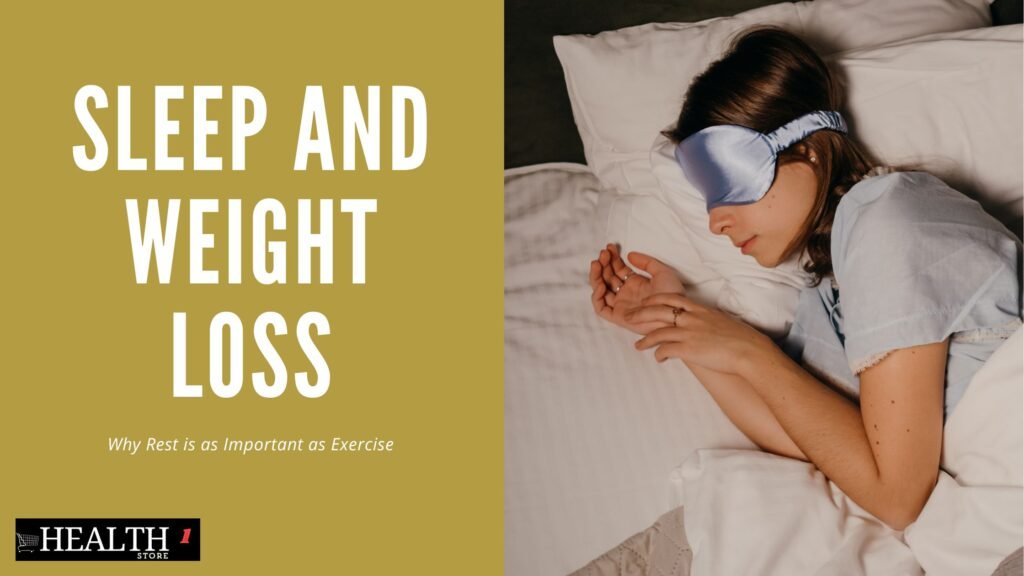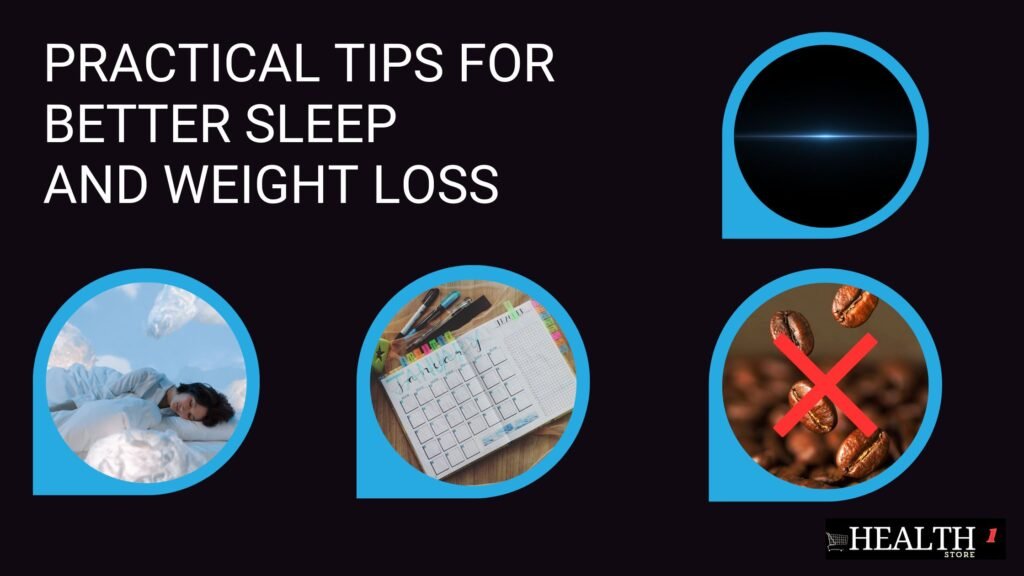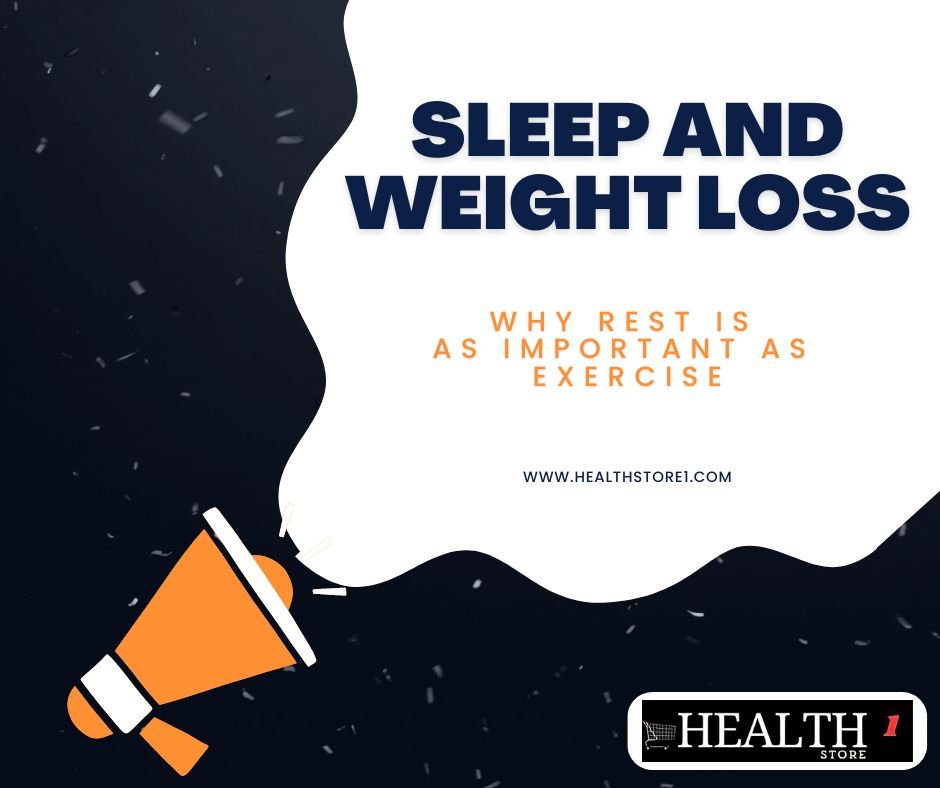Introduction to Sleep and Weight Loss
Most people focus on diet and exercise as the primary strategies for weight loss. However, there is another crucial yet often overlooked factor: sleep. Emerging research shows a strong connection between sleep and weight loss, with adequate rest playing a pivotal role in maintaining a healthy weight and improving the efficacy of exercise and diet. We’ll learn why sleep and weight loss are intricately linked and how ensuring proper rest can accelerate your weight loss journey.
Table of Contents
The link Between Sleep and Weight Loss
Sleep is a vital physiological process that influences multiple aspects of health, including weight management. Poor sleep quality or a lack of sufficient sleep can disrupt key hormones that regulate hunger, satiety, and fat storage. These hormones—ghrelin and leptin—are directly impacted by sleep patterns, affecting your overall calorie intake, energy levels, and ability to burn fat.

The Role of Hormones in Sleep and Weight Loss
Two hormones primarily responsible for regulating hunger and fullness are affected by sleep:
- Ghrelin: Known as the “hunger hormone,” ghrelin stimulates appetite. When you don’t get enough sleep, your body produces more ghrelin, which leads to increased hunger and calorie consumption.
- Leptin: This hormone signals to your brain when you’re full. Sleep deprivation reduces leptin levels, meaning you’ll feel less satisfied after eating and more likely to overeat.
Research has shown that sleep-deprived individuals have higher levels of ghrelin and lower levels of leptin, creating the perfect storm for weight gain.
| Hormone | Effect of Sleep Deprivation | Impact on Weight |
|---|---|---|
| Ghrelin | Increases | Increases hunger and appetite |
| Leptin | Decreases | Reduces feelings of fullness |
Scientific Studies on Sleep and Weight Loss
Several studies support the strong link between sleep and weight loss. Let’s examine some key research findings that illustrate how poor sleep habits contribute to weight gain and make weight loss more difficult.

1. Short Sleep Duration Increases Risk of Obesity
A meta-analysis published in the International Journal of Obesity reviewed multiple studies and found that individuals who consistently sleep less than 6 hours per night have a 55% higher risk of obesity compared to those who sleep 7–8 hours.
2. Sleep Deprivation Affects Food Choices
A study published in Nature Communications revealed that sleep-deprived individuals tend to prefer high-calorie, carbohydrate-dense foods. The brain’s reward centers become more active when sleep is inadequate, causing cravings for sugary and fatty foods.
3. Poor Sleep Reduces Fat Loss
A study published in the Annals of Internal Medicine found that participants on a calorie-restricted diet who slept 5.5 hours per night lost 55% less fat than those who slept 8.5 hours. This means that even with a proper diet, poor sleep can reduce the amount of fat your body burns.
Quality of Sleep and Weight Loss
While sleep duration is crucial, sleep quality is equally important. Poor-quality sleep can negatively impact weight loss efforts, even if you’re clocking in the recommended 7-8 hours.
1. Slow Metabolism
Lack of sleep affects your basal metabolic rate (BMR), which is the number of calories your body burns at rest. Sleep deprivation can slow down your metabolism, making it harder to burn calories and shed fat.
- Studies suggest that after just four nights of poor sleep, your body’s ability to use insulin effectively decreases by 30%. When insulin sensitivity decreases, fat cells can’t remove fatty acids and lipids from the blood as efficiently, leading to fat storage and weight gain.
2. Decreased Physical Activity
Insufficient sleep affects energy levels and can decrease your motivation to exercise. If you’re constantly tired, you’re less likely to engage in physical activity, which is a vital component of any weight loss plan.
A study published in Sleep Medicine found that people who slept for fewer hours tended to have lower levels of physical activity during the day, which in turn led to weight gain.
Sleep and Weight Loss: Why Rest is as Important as Exercise
While exercise is a crucial part of weight loss, sleep is equally, if not more, important. Here’s why:
1. Improved Recovery and Muscle Growth
Sleep is essential for muscle recovery. When you engage in physical activity, your body needs time to repair and build muscle tissue. Deep sleep stages, specifically REM (rapid eye movement) sleep, are critical for growth hormone secretion that facilitates muscle repair. The more lean muscle mass you have, the more calories you burn at rest, aiding in weight loss.
2. Balanced Hormones for Fat Loss
Sleep helps balance hormones that regulate fat storage and muscle growth. These include:
- Human Growth Hormone (HGH): Released during deep sleep, HGH is responsible for muscle growth and fat metabolism.
- Cortisol: When you’re sleep-deprived, cortisol levels increase, leading to stress-induced cravings and fat storage, particularly around the belly area.
| Hormone | Effect of Sleep on Weight |
|---|---|
| Human Growth Hormone | Promotes fat burning and muscle repair |
| Cortisol | Increases fat storage, especially belly fat |
3. Enhanced Cognitive Function and Willpower
Sleep deprivation can negatively affect cognitive function, resulting in impaired decision-making abilities and decreased willpower. When experiencing fatigue, individuals may find it more challenging to resist unhealthy food options and make rational dietary decisions. The frontal lobe, responsible for decision-making and self-control, is significantly impacted by the lack of sleep.
Practical Tips for Better Sleep and Weight Loss
If you’re aiming to lose weight, getting enough quality sleep should be a priority. Here are some tips to improve your sleep hygiene and, consequently, enhance your weight loss journey:

1. Set a Consistent Sleep Schedule
Go to bed and wake up at the same time every day, even on weekends. A consistent sleep schedule helps regulate your body’s internal clock, making it easier to fall asleep and wake up refreshed.
2. Create a Relaxing Bedtime Routine
Establishing a calming pre-sleep routine can signal to your body that it’s time to wind down. Consider activities like reading, meditating, or taking a warm bath.
3. Limit Blue Light Exposure Before Bed
Exposure to blue light from screens can interfere with the production of melatonin, the hormone that regulates sleep. Turn off electronic devices at least an hour before bed to promote better sleep quality.
4. Optimize Your Sleep Environment
Ensure your bedroom is conducive to sleep by keeping it dark, quiet, and cool. Consider investing in blackout curtains, white noise machines, or fans to create an optimal sleep environment.
5. Avoid Caffeine and Alcohol Intake
Caffeine and alcohol can disrupt your sleep patterns. Avoid consuming these substances in the hours leading up to bedtime to improve sleep quality.
The Duration of Sleep and Weight Loss Success
A study published in Sleep found that dieters who got 8.5 hours of sleep lost more fat than those who slept 5.5 hours per night, despite both groups following similar diets and exercise routines. This emphasizes how important sleep is for retaining muscle and losing fat, key factors in long-term weight loss success.
Conclusion: Sleep and Weight Loss
The relation between sleep and weight loss is undeniable. While exercise and diet are essential components of any weight loss plan, getting enough quality sleep is just as critical. Sleep influences key hormones that control hunger and satiety, affect metabolism, and enhance physical recovery—all of which play a significant role in achieving and maintaining a healthy weight.
To maximize your weight loss efforts, aim for 7–9 hours of sleep per night and focus on improving the quality of your sleep through healthy habits. By incorporating better sleep practices into your daily routine, you’ll not only feel more energized but also accelerate your journey to a healthier




